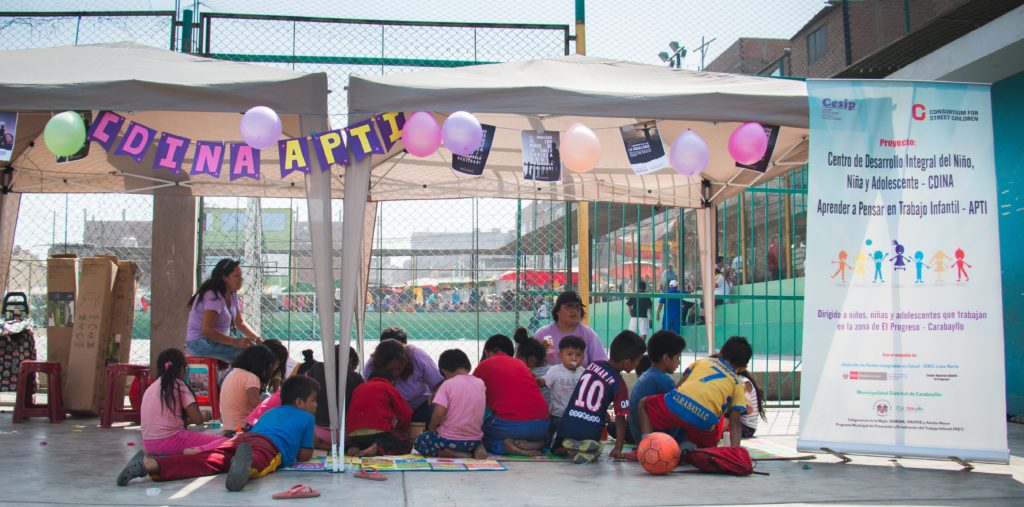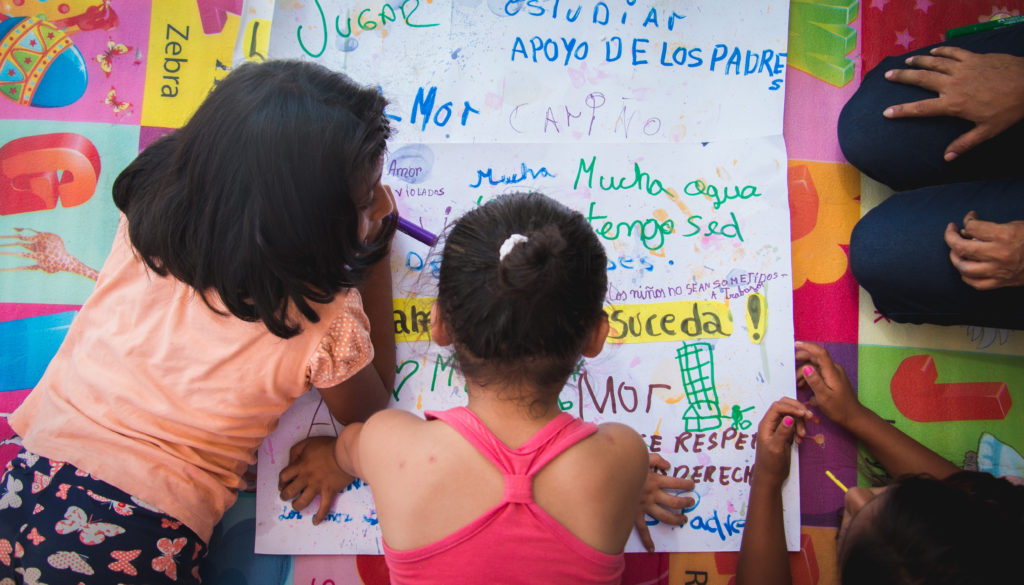Written by CESIP
The bustle is felt in the streets, which are transformed every day into markets. It’s 6 o’clock in the morning and fruit, vegetables, meats and all kinds of goods decorate the long rows of temporary stalls.
Today is Sunday; there is no school and it is a day of rest for the great majority of schoolchildren. But not for other children and adolescents who have to work in the area, sometimes with their family, sometimes with their employers or sometimes alone, because, as they point out: “today there are more sales and, therefore, more profit”
This reality means that the CDINA-APTI team, made up of professionals from the CESIP NGO and partner institutions, go to the area where the children and adolescents can be found working, since we have discovered that travelling to the areas where they are located is a good strategy, because a greater number of them benefit. Previously, we used to invite them to our headquarters but very few arrived, because attending our activities meant they stopped working for a few hours, which meant less income for them. So now we come to the sports areas located in the various markets in the vicinity, armed with awnings, tables, benches, “carpets” and materials. All with the aim of providing the boys and girls with the opportunity to learn, have fun and share.
While we are setting up the awnings, the boys and girls who work in the street come closer, with a great deal of curiosity and enthusiasm for taking part in the craft classes. Others come out loudly shouting “They’ve arrived, they’re here!”, inviting their peers to join in the fair.
After we have set up, the project team welcomes the children and adolescents, who are placed on the “carpets” according to their order of arrival to start the activities.
The educators in charge of the creative – recreational activity give each participant the materials that they will need while they read out the instructions for doing their crafts. Today they will make a pencil holder out of wooden “sticks”, cardboard, twine, stickers, and will use scissors, silicone cement and staplers.
During the activity they are heard saying “you have to stick here”, “this is how it is done…”, “can we change the sticker, please”, “how pretty my work is”, “lend me the scissors”, “I’ll help you “, etc. In this space the boys and girls have fun and learn by playing, we observe that the older children help the little ones, develop their personal and social skills, and also manage to express their emotions and opinions.
During the fair, we inform the parents about the project and we invite the boys and girls to come to the CDINA headquarters during the week to join in with this and other activities.
In addition to creative and recreational activities, attendees benefit from other services. Members of various state agencies cooperated with the activities, such as: the Emergency Centre for Women – CEM Carabayllo (1), a specialised, free public service for the prevention and awareness of family and sexual violence; The El Progreso Mother and Child Centre(2), whose professionals provided information on health care and the Municipal Programme for the Prevention and Eradication of Child Labour in the district of Carabayllo – PPETI (3). These institutions provided services to the boys and girls who work in the streets in the area and their families.
The evening arrives, the market vendors pack up their stalls and the street is free again, and it’s time for the team to leave. Today we managed to reach around 20 parents and 50 children and adolescents who left their work in the streets behind for a few hours to feel free and have fun.
While they help us to collect up the materials, we say goodbye to them and they enthusiastically ask when they can come back. What will we do next week? In response, we repeat the invitation to CDINA headquarters and explain that we will be back in three weeks. The following week we will go to other markets in the area, taking our fairs so that the boys and girls in the town can enjoy the activities and get access to health services and protection from violence.
And so, the day ended, with the satisfaction of having reached them and their families, we will see each other again soon…
- Service of the Ministry of Women and Vulnerable Populations – MIMP
- Agency of the Ministry of Health – MINSA
- Subdirectorate of Women, Defence of Women, Children and Adolescents – DEMUNA, Municipal Office for Caring for People with Disabilities – OMAPED and the Elderly of the Municipality of Carabayllo.
About the project
The Centro de Desarrollo Integral del Niño, Niña y Adolescentes [Centre for the Integral Development of Children and Adolescents] – CDINA Project and Aprender a Pensar en Trabajo Infantil [Learning to Think about Child Labour] – APTI, is run by the Centro de Estudios Sociales y Publicaciones [Centre for Social Studies and Publications] – CESIP NGO in collaboration with Consortium for Street Children (CSC) and funded by Red Nose Day Foundation.
The objective of the project is for children and adolescents who work in the street in Lima, Peru to improve the exercise of their rights to education, health, recreation and participation; and be more protected by their families and public bodies, avoiding the risk of a life on the street.

